A metonym of all things politics, Capitol Hill in Washington, D.C., has been the epicenter of young and seasoned political hopefuls for many years. Among those hopefuls are Colgate University alumni — some of whom have been fortunate enough to land in U.S. Senate and Congressional offices.
How did they accomplish these great feats? The Scene recently sat down with six alumni to hear them talk about their individual successes.

22nd District of New York Rep. Claudia Tenney in her New Hartford office. Photo by Mark DiOrio
Rep. Claudia Tenney ’83
Congresswoman (R-NY)
For Rep. Claudia Tenney, the past five years have meant a world of change in her move from New York State Assemblywoman to Congresswoman. In fall 2012, Tenney was reelected to the then newly formed 101st Assembly district. The redistricting changed her district from a cluster of central New York towns to a four hours’ worth drive that stretched from New Hartford (outside of Utica) to Montgomery (just north of New York City). The Albany Times Union described the district as “made up of the misfit towns nobody wants.” Even so, Tenney took on the challenge of representing a completely new constituent base.
But, after two terms, she felt strongly that her fellow politicians needed to focus more on the real issues and do a better job of representing their constituencies. So, she made the biggest leap of her career: She ran for Congress.
A day in the life
“While I’m in D.C., we’ll have conference at 9 a.m., then meetings with constituents all day. We vote twice a day on bills. If I have a bill that’s on the floor or in the jurisdiction of the committee I serve on, I’ll speak on that. I’m on the Financial Services Committee, and I serve on three subcommittees. Our committee brings in a number of leaders in the industry to speak. Recently, we had [U.S. Department of Housing and Urban Development Secretary] Ben Carson and the Equifax CEO. There’s always one committee meeting or hearing per session day. Sometimes a hearing takes an hour, three hours. Sometimes, it can take two days, in a 22-bill series. That’s a huge difference between Congress and the Assembly. In the Assembly, that process is much shorter and one sided. With bills on the floor in Congress, there’s an often lengthy debate from both sides.
“In the evening, there are several events — sometimes a fundraiser, meetings with constituent groups. We also meet with foreign ambassadors. Usually on weekends, I travel across the district meeting with constituents all day.”
Issues she cares about
The economy. “The 22nd District is one of the most economically depressed areas in the nation. Our region was once a hub for manufacturing, but unfair trade deals and high tax rates have sent our jobs overseas and caused people to leave our state in record numbers. Our region has become the Rust Belt of New York. It’s among my top priorities to bring jobs and people back to our community and allow our businesses and families to thrive once again.”
The trade issue. “I support free trade between the United States and the world, but it must be fair. Many regulations that have been passed down aren’t fair to the consumer. Often when deals are made, the wealthy and well connected receive all the benefits and the consumers and middle-income families get all the penalties.”
“There are 11 colleges in our district. We want to create a thriving environment in upstate New York that encourages our students, the next generation of leaders, to stay.”
Agriculture. “It’s the number one industry in our state. Upstate New York has a rich history of agriculture, and our region is home to a number of dairy farmers. Small dairy farmers are struggling under the current regulatory environment. I’m working on writing legislation to help our small farmers.”
“The 22nd District has a very large refugee population with 42 languages spoken in the Utica school district alone. As someone with a long history of helping to resettle refugees in our area, I’m interested in working with our refugee population to help them realize their American dream, too.”
“The 22nd District has a very large refugee population with 42 languages spoken in the Utica school district alone. As someone with a long history of helping to resettle refugees in our area, I’m interested in working with our refugee population to help them realize their American dream, too.”
Being a member
“As much as Congress gets derided, there are a number of accommodating, good public servants on both sides. It’s fun to get to know them in a different way. In my freshman (Congress) class, they sent us to Williamsburg for an orientation to learn the basics of how to be a member. One of my colleagues said, ‘What is going to define us as a freshman class?’ So, we made a commitment to civility — to reach out to each other in an effort to change the tone of our current political discourse. Putting out bills and resolutions, together we’re making our effort to include our colleagues on the other side of the aisle. There was an equal number of Republicans and Democrats, so it worked out well.
“There’s been some really good people I’ve met. We all play together, Republican and Democrat, Senate and House members, on the Congressional Softball Team. It’s a great opportunity to get to know your colleagues on the other side of the aisle and the other side of the Capitol. We’ve found out we do have more in common than you think.”
Staying strong
“In politics, one can get really caught up in the orthodoxy of what it is. You have to be resilient and not take things too personally.
“Years ago, when I was partner in a law firm, on Fridays, there’d be a note posted that said, ‘Meeting Friday, noon, all the men.’ I didn’t take that personally. My father always said, ‘Don’t be a victim.’ That reflects on them, not you. All the successful people I know, they don’t get caught up in that stuff. It’s hard to do, but that’s what makes you strong.”
Reflecting
“[While at Colgate], I went to Italy and Yugoslavia. I took courses on China, Africa, and Russia. All of my experiences were examples of an effort to learn and understand something I didn’t know about. Doing things outside of my comfort zone has been the defining feature of my life. I’ve failed a lot and learned more from my failures than successes. From these experiences, I learned more about who I am, my mission, and what I wanted to accomplish.”
THE FIVE Cs
“The night before Colgate’s Convocation [in 1983], Father Theodore Hesburgh [then president of the University of Notre Dame] gave a speech. He said, ‘You’ve got to live by the three Cs: competence, compassion, and commitment to the cause.’ I’ve added my own two Cs: character and courage. I strive to live by this mission in all that I do, and it’s what has driven me in my role in public service.”

Franco Brunet ’16, a staff member in Sen. Tim Kaine’s (D-Va.) office, strides across the rotunda in the Russell Building in Washington, D.C. Photo by André Chung
Franco Brunet ’16
Staff Assistant, Sen. Tim Kaine (D-Va.)
Francis (Franco) Brunet was raised with just the right ingredients necessary for him to end up with a career in politics. He grew up between St. Thomas, Virgin Islands — where his mother was chief policy advisor for the lieutenant governor — and Port-au-Prince, Haiti — where his father ran for president in 2015. And his brother, Thomas, works in the U.S. Senate.
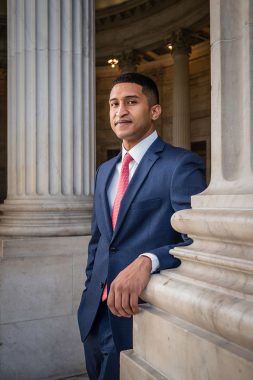
Photo by André Chung
“The example my parents set definitely helped to inform my interests,” he says.
But what seemed like the perfect career path for him didn’t hit Brunet until his sophomore year at Colgate, when he studied international relations and philosophy. That’s when he came in contact with Professor Karen Harpp, who, he says, “helped me to maximize my Colgate interests and opportunities. She went above and beyond on many occasions, even after she was no longer officially my adviser.”
The following year, he reached out to Amy Dudley ’06, who was communications director in Sen. Tim Kaine’s office. In June 2016, she suggested he apply for the legislative intern position — for which he was hired and he later slid into his current role at the front desk as staff assistant. Dudley has since transitioned off of the Hill, but for about eight months, she and Brunet overlapped and “repped Colgate every chance we could,” he says.
In his current role, Brunet works on aspects of legislation, communications, and administration — wearing many hats. “Being on the Hill is a great privilege,” he says.
“I’m a big believer in experiences and being able to take away from them,” Brunet adds. “I’ve had a diverse perspective on a lot of things. Coming from two places in the Caribbean, being all over the East Coast, I’ve been introduced to a lot of different perspectives in my short life so far. That’s been helpful in allowing me to contextualize things and further my interests. It gives me a better sense of where help is needed.”
Looking ahead, Brunet sees himself continuing to work on the Hill but taking on more policy responsibilities. He also hopes to go to law school or a graduate program that focuses on public or international policy.
“I ultimately want to further my interests and passion so I can enact meaningful change,” Brunet says.
Dan McLean ’97
Senior Press Advisor, Sen. Bernie Sanders (I-Vt.)
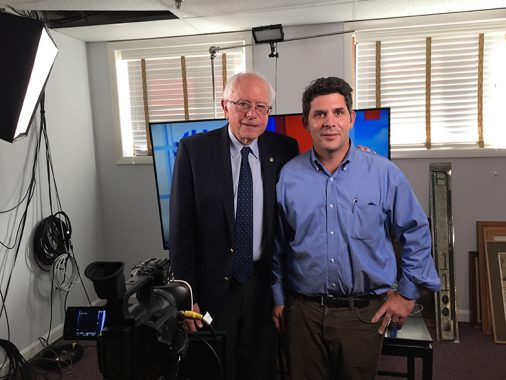
Dan McLean and Senator Bernie Sanders
Many years covering politics as a newspaper journalist — and his openness to new opportunities amid a changing newspaper industry — earned Dan McLean a spot as senior press advisor for Sen. Bernie Sanders.
How he landed in Sanders’s office
“I was hired by the Burlington Free Press, and my interest focused on covering politics. I got to know Bernie pretty well from doing interviews on the news side. He thought I was smart and asked good questions.”
His role
McLean’s responsibilities include, but are not limited to, fielding reporters’ questions, pulling information from policy staff and drafting press statements for Sanders to review, writing press releases, and building media campaigns to help make complex political ideas approachable. “We have to think about how events will be reported, if we want to be in that news story, if we should comment on that,” he says. “That’s where my experience with working in newsrooms comes in. That has served me well.”
On finding support through Colgate
“I remember going to a Real World event, where alumni come back and talk about what they do. Eamon Javers ’94 [now Washington Correspondent for CNBC] spoke. He was an editor at The Hill. I expressed an interest in politics and journalism. With his help, I was able to get an internship there after graduation, covering Congress. During my internship, Howard Fineman ’70, who now works at Huffington Post, Eamon Javers, and I ended up grabbing a drink. Fineman shared his thoughts about Washington politics. I’ve always found Colgate alumni to be very helpful.”
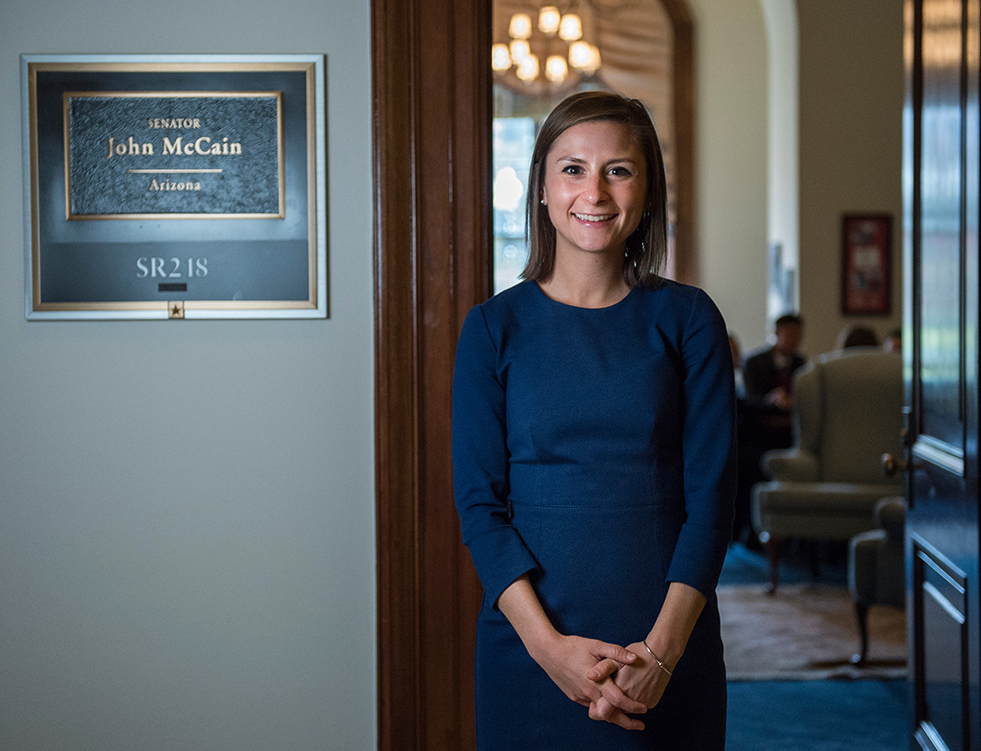
Julie Tarallo ’11, communications director for Sen. John McCain, R-AZ. Photo by Mark DiOrio
Julie Tarallo ’11
Communications Director, Sen. John McCain (R-Ariz.)
Julie Tarallo wakes up at the crack of dawn each weekday morning. While preparing to go to work as Sen. John McCain’s communications director, she’s glued to her phone reading every major news source she can get her hands on so that the senator “never gets caught flat-footed,” she says.
How she got to Capitol Hill
During Tarallo’s junior year at Colgate, a contact helped her get a summer internship at the public relations firm Powell Tate in D.C. The firm offered Tarallo a full-time position as assistant account executive after graduation, and she worked her way up to a senior account executive. At Powell Tate, Tarallo helped clients from the government, nonprofit, and business sectors develop and implement their communications strategies.
In her spare time, Tarallo honed her networking skills, and soon she “had a roster of people who were looking out for me,” she says. Through one of those contacts, Tarallo joined McCain’s office, starting as deputy press secretary, then working her way up to press secretary and now communications director. She oversees the senator’s communications strategy; writes statements, opinion editorials, and speeches; books the senator on interviews and prepares him for media engagements; fields constituent questions and reporter inquiries; manages his social media accounts; and more. She also manages the digital director and the press secretary.
“No two days are the same,” she says. “I wake up every morning excited to go to work.”
What she learned at Colgate
A philosophy and Spanish double major, Tarallo benefited from the rich discussions, writing, and reading in her courses. Professors were “open to you speaking your mind, looking into an issue, and getting to know it intimately,” which is a big piece of the work she does now with McCain.
Finding balance
When her day ends at around 7 p.m., Tarallo is on her phone reading news again as she walks to the Metro. But, even after her busy days, she finds time to do something she loves: running. While attending Colgate, Tarallo ran cross country and track. She was Patriot League Champion in the 10,000 meters as a sophomore in 2009, and captained the cross country and track teams as a senior. As captain, she helped lead the team to its first Patriot League team title in the university’s history in 2010.
Since then, her passion for running hasn’t waned. Today, she holds a spot as the women’s team director of the Georgetown Running Club and runs at night.
Erin Hatch ’10
Press Secretary, Ways and Means Committee Democrats, U.S. House of Representatives
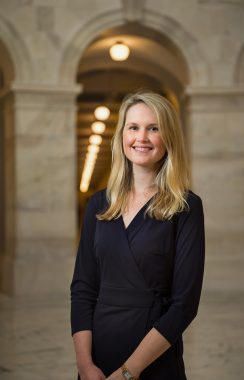
Erin Hatch ’10, press secretary for the Ways and Means Committee, Democrats. Photo by Mark DiOrio
She wasn’t certain what she wanted to do careerwise upon graduating, but making Colgate connections through alumni events in D.C. helped Hatch find her way. She first spent a year working for Sen. Cory Booker (D-N.J.). Then, Hatch got a lead on a press secretary position in the office of Rep. Joaquin Castro (D-Texas) from Alan He ’12, a political reporter whom she befriended.
Hatch became Castro’s press secretary, and a few years later, his communications director. Her responsibilities included working with reporters, writing a variety of materials, staffing and organizing press events, and more.
“As a political nerd, it’s neat to be in the middle of everything,” Hatch says.
Just recently, she switched roles and became the press secretary for the Ways and Means Committee Democrats. “Huge issues that affect every single American are in the committee’s jurisdiction,” she explains. Case in point, Hatch started her new job during the tax debate. “It’s at once thrilling and sobering to be a part of such consequential work,” she says.
“As a political nerd, it’s neat to be in the middle of everything.”
In terms of preparation, Hatch has her Colgate education to thank. “Knowing how to switch gears, and taking writing-intensive courses” all helped, she says. “Writing is a huge part of the work I do. Everything in politics is about persuasion.”
Beyond this, she is quickly reminded of Elizabeth Oblinger ’10, her best friend who previously worked for a Republican senator and was her D.C. roommate for five years. Living with Oblinger helped Hatch keep perspective, she says.
“In these partisan times, we’re all still Americans and still people. The divisions don’t run that deep,” Hatch adds. “Working on the Hill, we’re all here to try to make the country a better place.”
Bryce Mongeon ’12
Senior Legislative Assistant, Rep. Charlie Dent (R-Pa.)
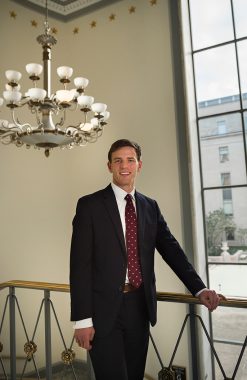
Bryce Mongeon ’12, Senior Legislate Assistant to Rep. Charlie Dent (R-PA) is pictured on Capitol Hill, Nov. 6, 2017 in Washington, D.C.
Mark DiOrio / Colgate University
In his current role with Rep. Charlie Dent’s office, Mongeon appreciates understanding the concerns of Dent’s constituents, “figuring out the nexus of their problems and potential ways to give them answers,” Mongeon says — especially because he hails from Dent’s state of Pennsylvania.
When Mongeon arrives in the office, he checks what Dent might be covering on the Appropriations Committee, prepares Dent to meet with constituent groups, and researches issues.
Colgate prepared Mongeon for this position by teaching him how to digest information and translate it for laypeople.
Also, being a student-athlete, he came away from his college experience as a pro with time-management skills. As a football player, Mongeon had to learn how to balance his class schedule with his extracurricular activities. From a rigor perspective, he had to juggle waking up early to weightlift and going to practice with a full course load. “It all seemed daunting, but when I came to D.C., I thought, ‘This is not as bad.’” It showed him what he was capable of, he says.

